

The World's Smartest Cities - Forbes.com. Very Smart Cities - Forbes.com. America's Power System Is Powerless - Forbes.com. Smart Cities - State of Green. By 2050, more than 6 billion people will live in urban areas.

This development calls for ‘smart’ approaches to ensure that cities are optimized for economic activity, energy consumption, environmental impact and ‘the good life’. The road towards a smart and more sustainable city is long termed planning and design. This requires rethinking – we have to think smart. Cities In Competition: Branding The Smart City. Hypothetical smart city Malt.
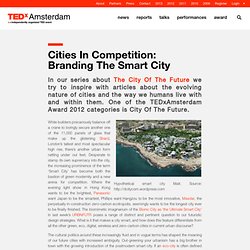
Source: While builders precariously balance off a crane to lovingly secure another one of the 11,000 panels of glass that make up the glistening Shard, London’s tallest and most spectacular high rise, there’s another urban form rattling under our feet. Desperate to stamp its own supremacy into the city, the increasing prominence of the term ‘Smart City’ has become both the bastion of green modernity and a new arena for competition. Where the evening light show in Hong Kong wants to be the brightest, Panasonic want Japan to be the smartest, Phillips want Hangzou to be the most innovative, Masdar, the perpetually in-construction zero-carbon ecotropolis, seemingly wants to be the longest city ever to be finally finished.
The biomimetic imaginarium of the Bionic City as ‘the Ultimate Smart City’ in last week’s URBNFUTR poses a range of distinct and pertinent question to our futuristic design strategies. No one likes a city that's too smart. This week London hosts a jamboree of computer geeks, politicians, and urban planners from around the world.
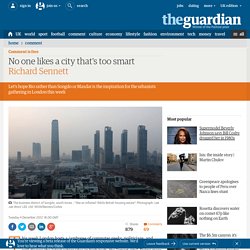
At the Urban Age conference, they will discuss the latest whizz idea in high tech, the "smart city". Doing more than programming traffic, the smart city's computers will calculate where offices and shops can be laid out most efficiently, where people should sleep, and how all the parts of urban life should be fitted together. Science fiction? Smart cities are being built in the Middle East and in Korea; they have become a model for developers in China, and for redevelopment in Europe. Thanks to the digital revolution, at last life in cities can be brought under control. You don't have to be a romantic to doubt it.
The debate about good engineering has changed now because digital technology has shifted the technological focus to information processing; this can occur in handheld computers linked to "clouds", or in command-and-control centres. But isn't this comparison unfair? Sustainable Development - Who Needs Smart Cities for Sustainable Development? With more than half of the world’s population already living in urban areas, and that percentage expected to rise to 75 percent by 2050, it is clear that the path to sustainable development must pass through cities.
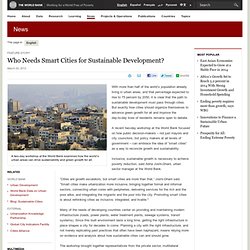
But exactly how cities should organize themselves to advance green growth for all and improve the day-to-day lives of residents remains open to debate. A recent two-day workshop at the World Bank focused on how public decision-makers – not just mayors and city councilors, but policy makers at all levels of government – can embrace the idea of “smart cities” as a way to reconcile growth and sustainability. Inclusive, sustainable growth is necessary to achieve poverty reduction, said Abha Joshi-Ghani, urban sector manager at the World Bank. “Cities are growth escalators, but smart cities are more than that,” Joshi-Ghani said. One key to any “smart city,” they said, is data.
Best practices Not all initiatives involve large global companies. Power and politics in smart cities. Large cities are responsible for up to 80% of global Greenhouse Gas emissions.
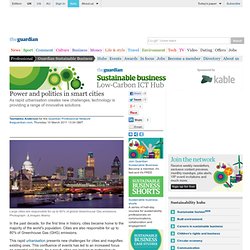
Photograph: JLImages /Alamy In the past decade, for the first time in history, cities became home to the majority of the world's population. Cities are also responsible for up to 80% of Greenhouse Gas (GHG) emissions. This rapid urbanisation presents new challenges for cities and magnifies existing ones. This confluence of events has led to an increased focus on potential solutions. Information and Communication Technologies (ICTs) is one set of technologies that holds great promise. However, in our SMART2020 webinar on 17 February, our guest speaker Simon Giles, partner at Accenture and global lead for Smart Technology Strategy, argued that the ICT sector has not lived up to the expectations of the media, city governments and other organisations with respect to its role in intelligent urbanisation.
It's seems, therefore, that a truly smart city isn't simply one that makes strategic use of ICT. Smart, smarter and smartest cities - Marion Waller. Smart Cities: Collaboration is Key to Realizing Technology’s Promise « Building Resilient Regions. If when you hear the term “smart city” you imagine a robotic maid and taking your flying saucer to work, think again.
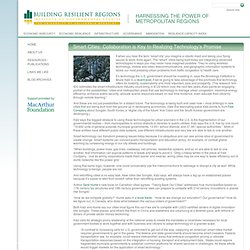
The “smart” cities being built today are integrating advanced technologies in ways you may never have imagined possible. They’re using wireless technology, mobile and video telecommunications, and geographic information systems to tackle our most pressing urban problems from traffic congestion to health care. It’s technology the U.S. government should be investing in, says the Brookings Institution’s Bruce Katz in a recent post, if we’re going to take advantage of the promises that technology offers for livability, sustainability and most important, jobs and prosperity. And these are not just possibilities for a distant future.
The technology is being built and used now – most strikingly in new cities that are being built from the ground up in developing economies. And retrofitting cities is no easy task. Author Gord Hume‘s new book on Canadian cities agrees.